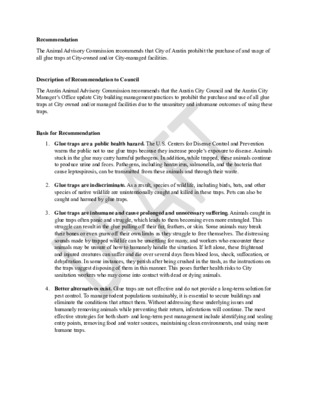Item 7 - Glue Trap Ban Draft Recommendation Version 2 — original pdf
Backup

Recommendation The Animal Advisory Commission recommends that City of Austin prohibit the purchase of and usage of all glue traps at City-owned and/or City-managed facilities. Description of Recommendation to Council The Austin Animal Advisory Commission recommends that the Austin City Council and the Austin City Manager’s Office update City building management practices to prohibit the purchase and use of all glue traps at City owned and/or managed facilities due to the unsanitary and inhumane outcomes of using these traps. Basis for Recommendation 1. Glue traps are a public health hazard. The U.S. Centers for Disease Control and Prevention warns the public not to use glue traps because they increase people’s exposure to disease. Animals stuck in the glue may carry harmful pathogens. In addition, while trapped, these animals continue to produce urine and feces. Pathogens, including hantavirus, salmonella, and the bacteria that cause leptospirosis, can be transmitted from these animals and through their waste. 2. Glue traps are indiscriminate. As a result, species of wildlife, including birds, bats, and other species of native wildlife are unintentionally caught and killed in these traps. Pets can also be caught and harmed by glue traps. 3. Glue traps are inhumane and cause prolonged and unnecessary suffering. Animals caught in glue traps often panic and struggle, which leads to them becoming even more entangled. This struggle can result in the glue pulling off their fur, feathers, or skin. Some animals may break their bones or even gnaw off their own limbs as they struggle to free themselves. The distressing sounds made by trapped wildlife can be unsettling for many, and workers who encounter these animals may be unsure of how to humanely handle the situation. If left alone, these frightened and injured creatures can suffer and die over several days from blood loss, shock, suffocation, or dehydration. In some instances, they perish after being crushed in the trash, as the instructions on the traps suggest disposing of them in this manner. This poses further health risks to City sanitation workers who may come into contact with dead or dying animals. 4. Better alternatives exist. Glue traps are not effective and do not provide a long-term solution for pest control. To manage rodent populations sustainably, it is essential to secure buildings and eliminate the conditions that attract them. Without addressing these underlying issues and humanely removing animals while preventing their return, infestations will continue. The most effective strategies for both short- and long-term pest management include identifying and sealing entry points, removing food and water sources, maintaining clean environments, and using more humane traps.